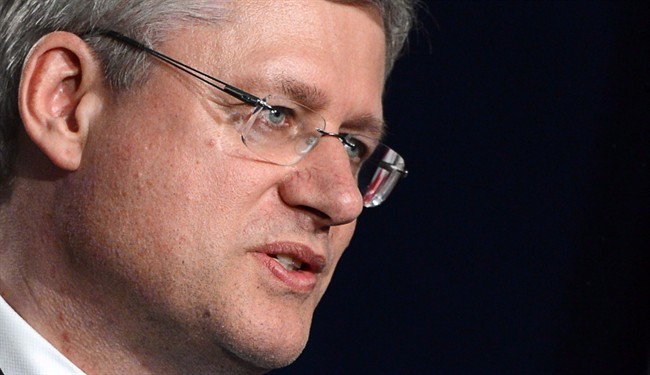OTTAWA – Taxpayers will be footing the bill for an entourage of at least 30 business people and community leaders to accompany Prime Minister Stephen Harper on his Middle East visit starting this weekend, his spokesman says.

Air travel and some accommodation costs will be paid out of government coffers, although full details of the final tally are not yet available, Jason MacDonald said Friday.
There is also as yet no complete list of all of those who will be accompanying Harper on the trip, MacDonald said.
But MacDonald said the list includes at least 30 people. An unknown number of other people are flying to Israel on their own dime.
“It’s still in flux. It is a significant delegation,” he said.
“As far as who pays, typically when people are invited to fly with the prime minister on a trip like this, as part of the delegation, the government of Canada will cover the costs for the travel.”
MacDonald said a cost estimate was not available. Media organizations that are travelling with the prime minister are paying $8,000 a head, a price tag that includes ground transport and access to communication facilities.
Harper’s delegation will include business leaders, and leaders from various communities, including cultural communities, MacDonald said.
They were invited because they will be taking part in business meetings and cultural events on the trip, he added.
Harper will also bring a sizable entourage of his cabinet for portions of the trip, including Foreign Affairs Minister John Baird, Employment Minister Jason Kenney, Industry Minister James Moore and Natural Resources Minister Joe Oliver.
Development Minister Christian Paradis and Trade Minister Ed Fast are also part of the delegation, MacDonald said.
“Tomorrow I’ll be joining the prime minister as we depart for Israel,” Paradis writes in an email distributed to Conservative supporters Friday to promote a special section of Harper’s website dedicated to the trip.
“I don’t want you to miss out on this historic trip to the Holy Land.”
Other “caucus colleagues” will be on the plane, but MacDonald was unable to name which other Conservative MPs or senators might be making the trip.
Harper is to spend a week in Israel, the West Bank and Jordan. He will meet Israeli and Palestinian leaders, as well as the king of Jordan.
Harper is also to address the Israeli parliament, known as the Knesset – the first Canadian prime minister to do so. He will also receive an honorary degree from Tel Aviv University.
Harper will promote commercial relations, as well as and peace and security in the region, said MacDonald.
The ongoing Syrian civil war, the Iran nuclear crisis and the Middle East peace process will be on the agenda.
It’s Harper’s first visit to Israel since winning power in 2006, though he wasted little time in shifting his government’s Middle East policy towards the Jewish state.
In the summer of the 2006, while Israeli warplanes were pounding Lebanon after Hezbollah militants kidnapped an Israeli soldier, Harper characterized the response as “measured.”
That comment angered Canadians of Arab and Muslim descent, and was widely viewed by analysts as marking a significant shift away from Canada’s traditional role as an honest broker in the Middle East.
Harper has also created a warm relationship with Israeli Prime Minister Benjamin Netanyahu, who has called Harper a friend of Israel.
Harper’s unwavering support of Israel was on full display again Friday when his spokesman sparred at length with reporters over Canada’s policy towards Israeli settlements in Palestinian territory.
MacDonald refused to say whether Harper endorsed the policy statement on the Foreign Affairs Department website.
It says: “As referred to in UN Security Council Resolutions 446 and 465, Israeli settlements in the occupied territories are a violation of the Fourth Geneva Convention. The settlements also constitute a serious obstacle to achieving a comprehensive, just and lasting peace.”
MacDonald repeated the same answer, almost verbatim, when pressed on how Harper views the settlement issue.
“Canadian policy is what the prime minister has articulated, which is that we want and support a two-state solution,” he said at one point. “It has to be arrived at through negotiations. And unilateral action is not going to help that.”

















Comments